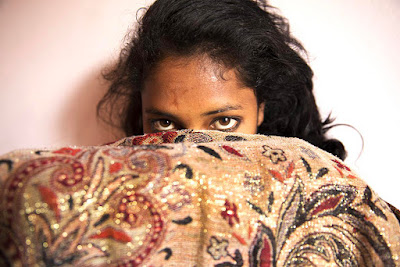Photograph by Lizzie Sadin
is devoted to Modern Day Slavery and its Incidence Among Women
+ + +
As part of the 2017 Visa pour l’Image Festival in Perpignan, the Fondation Carmignac announced the Laureate of the 8th Carmignac Photojournalism Award to France’s Lizzie Sadin, for her project on the enslavement of women and girls in Nepal.
Following a July 2016 call for applications, the jury (listed below), presided by Monique Villa, chose to give a voice to Nepalese women by selecting Lizzie Sadin’s project. After four months of reporting in the field between February and May 2017, the photojournalist has brought back a deeply moving testimony on gender-based human trafficking and how rooted it is in Nepalese society.
After a devastating earthquake that killed 9,000 people and displaced 650,000 others in 2015, the daily life of many Nepalese was shattered. Unemployment and the extremely precarious living conditions have given rise to more and more traffickers every day.
To Lizzie Sadin, this trafficking, based on the sale and forced prostitution of women and girls by “friends” or even family members, is carried out not just for economic reasons, but also for cultural reasons. It affects a woman’s fundamental rights: the right to get a proper education, the right to control her own destiny, the right to live without fear of acts of physical or psychological violence inflicted by her own husband, the right not to be sold …An entire belief system that needs reversing: one that, in Nepal, defines women as being inferior to men.
The International Labour Organisation (ILO) estimates that there are more than 2.5 million victims of modern day slavery, and women make up the majority of this number. According to Amnesty International, women represent 80% of the victims of human trafficking, of whom nearly 50% are minors. The types of exploitation are numerous: sexual, forced labour, domestic slavery…
Women are all the more vulnerable in situations where they have little protection. The countries of South and South-East Asia as well as those of Central Europe and the ex-USSR are the principal purveyors of these modernday slaves. Although abduction is the most common route into slavery, women are also sold by their own families or entrapped into joining the networks of traffickers.
Armed conflicts exacerbate discriminatory and violent behaviour towards women. In Lebanon, Jordan and Turkey, numerous camps of Syrian refugees have emerged. These refugees provide easy prey for networks on the lookout for ‘merchandise’. In Nigeria, in the Darfur region of western Sudan and in the Democratic Republic of Congo, women and girls are subject to abductions carried out to provide their kidnappers with sexual or domestic slaves.
Following a July 2016 call for applications, the jury (listed below), presided by Monique Villa, chose to give a voice to Nepalese women by selecting Lizzie Sadin’s project. After four months of reporting in the field between February and May 2017, the photojournalist has brought back a deeply moving testimony on gender-based human trafficking and how rooted it is in Nepalese society.
After a devastating earthquake that killed 9,000 people and displaced 650,000 others in 2015, the daily life of many Nepalese was shattered. Unemployment and the extremely precarious living conditions have given rise to more and more traffickers every day.
To Lizzie Sadin, this trafficking, based on the sale and forced prostitution of women and girls by “friends” or even family members, is carried out not just for economic reasons, but also for cultural reasons. It affects a woman’s fundamental rights: the right to get a proper education, the right to control her own destiny, the right to live without fear of acts of physical or psychological violence inflicted by her own husband, the right not to be sold …An entire belief system that needs reversing: one that, in Nepal, defines women as being inferior to men.
The International Labour Organisation (ILO) estimates that there are more than 2.5 million victims of modern day slavery, and women make up the majority of this number. According to Amnesty International, women represent 80% of the victims of human trafficking, of whom nearly 50% are minors. The types of exploitation are numerous: sexual, forced labour, domestic slavery…
Women are all the more vulnerable in situations where they have little protection. The countries of South and South-East Asia as well as those of Central Europe and the ex-USSR are the principal purveyors of these modernday slaves. Although abduction is the most common route into slavery, women are also sold by their own families or entrapped into joining the networks of traffickers.
Armed conflicts exacerbate discriminatory and violent behaviour towards women. In Lebanon, Jordan and Turkey, numerous camps of Syrian refugees have emerged. These refugees provide easy prey for networks on the lookout for ‘merchandise’. In Nigeria, in the Darfur region of western Sudan and in the Democratic Republic of Congo, women and girls are subject to abductions carried out to provide their kidnappers with sexual or domestic slaves.
+ + +
Chaired by Monique Villa, CEO of the Thomson Reuters Foundation and Founder of Trust Women, the 8th edition of the Carmignac photojournalism Award aims to make visible these forms of modern day slavery, by supporting a project with the potential to become a tool for reflection and concrete change in the fight against the trafficking of women.
The panel comprised • Elizabeth Avedon, independent curator specialized in photography • Francesca Fabiani, Photography Special Projects, Department for Contemporary Art and Architecture, Ministry of Culture, Italy • Thierry Grillet, Chief Curator of Bibliothèque nationale de France (BNF) • Olivier Laurent, Editor-in-chief of Time Lightbox • Élisabeth Quin, journalist, writer and Arte TV Presenter (28 Minutes) • Narciso Contreras, laureate of the 7th edition of the Carmignac Award
Laureate of the 8th Carmignac Photojournalism Award
Opens October 20, 2017
Hôtel de l’Industrie, Paris
with an accompanying Monograph
more details to follow....





No comments:
Post a Comment